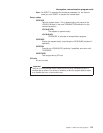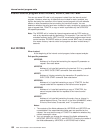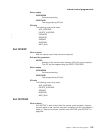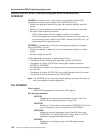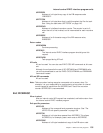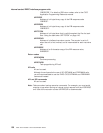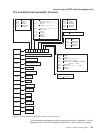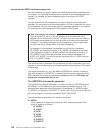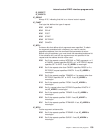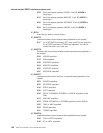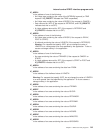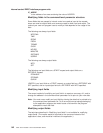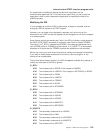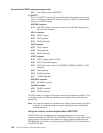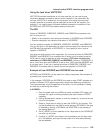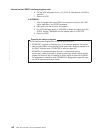IC_EIDOPT7
IC_EIDOPT8
IC_GROUP
Always X'10', indicating that this is an interval control request.
IC_FUNCT
One byte that defines the type of request:
X'02' ASKTIME
X'04' DELAY
X'06' POST
X'08' START
X'0A' RETRIEVE
X'0C' CANCEL
IC_BITS1
Existence bits that define which arguments were specified. To obtain
the argument associated with a keyword, you need to use the
appropriate address from the command-level parameter structure.
Before using this address, you must check the associated existence bit.
If the existence bit is set off, the argument was not specified in the
request and the address should not be used.
X'80' Set if the request contains INTERVAL or TIME arguments, or if
a CANCEL request specifies REQID, or if a RETRIEVE request
specifies SET or INTO. If set, IC_ADDR1 is meaningful.
X'40' Set if the request other than CANCEL specifies REQID or if a
RETRIEVE request specifies LENGTH. If set, IC_ADDR2 is
meaningful.
X'20' Set if the request specifies TRANSID or if a request other than
RETRIEVE specifies SET or INTO. If set, IC_ADDR3 is
meaningful.
X'10' Set if the request specifies FROM. If set, IC_ADDR4 is
meaningful.
X'08' Set if a request other than RETRIEVE specifies LENGTH. If
set, IC_ADDR5 is meaningful.
X'04' Set if the request specifies TERMID. If set, IC_ADDR6 is
meaningful.
X'02' Set if the request specifies SYSID. If set, IC_ADDR7 is
meaningful.
X'01' Set if the request specifies RTRANSID. If set, IC_ADDR8 is
meaningful.
IC_BITS2
Further argument existence bits.
X'80' Set if the request specifies RTERMID. If set, IC_ADDR9 is
meaningful.
X'40' Set if the request specifies QUEUE. If set, IC_ADDRA is
meaningful.
interval control EXEC interface program exits
Chapter 1. Global user exit programs 139



